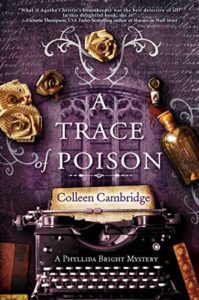 The second book in Cambridge’s delightful series about Agatha Christie’s housekeeper, Phyllida Bright, does not disappoint. The first one was a take on The Body in the Library; this book takes place at a “Murder Fête,” an early version of a mystery book conference. In this iteration, there are just a few authors, but they are Agatha Christie, Dorothy Sayers, G.K. Chesterton, and Anthony Berkley. Pretty swoon-worthy. There’s also a short story contest judged by the celeb authors, and the outcome is hotly anticipated by the local mystery writing group. The prize is publication.
The second book in Cambridge’s delightful series about Agatha Christie’s housekeeper, Phyllida Bright, does not disappoint. The first one was a take on The Body in the Library; this book takes place at a “Murder Fête,” an early version of a mystery book conference. In this iteration, there are just a few authors, but they are Agatha Christie, Dorothy Sayers, G.K. Chesterton, and Anthony Berkley. Pretty swoon-worthy. There’s also a short story contest judged by the celeb authors, and the outcome is hotly anticipated by the local mystery writing group. The prize is publication.
The celebrities really play a very tiny part in the proceedings – these are Phyllida’s books all the way. When the local priest drops dead at the opening cocktail party, Agatha takes Phyllida aside (the two had been wartime friends) and asks her to investigate things, much to the annoyance of the local constabulary. Cambridge did an excellent job of establishing Phyllida’s character in the first novel, and it’s a perfect one for a detective. She’s exacting, thorough, and misses no detail (which also makes her an excellent housekeeper). She’s insatiably curious, which doesn’t hurt either.
Cambridge provides a nice circle of suspects within the writer’s group, which is varied enough for interest and reaches different segments of village society. Pretty much everyone hated one of the members of the circle, and he was widely supposed to be the winner of the short story contest. It also appears that he, rather than the priest, may have been the intended murder victim.
While Phyllida capably manages the festival, she’s also conducting her own murder inquiry. Cambridge uses many, many golden age tropes, freshening them up with a bit of modern sparkle. One of them is her version of Holmes’ Baker Street Irregulars. Phyllida’s informants are “garbed in aprons, caps, and livery.” The scene where she extracts information from the various maids, cooks and underfootmen belonging to different households in town is one of the strongest in the book.
Phyllida’s bête noir is Agatha’s chauffeur and his dog – she views the dog as a slavering beast, but it’s clear from the reactions of other characters in the book that he’s an adorable, sweet puppy. The chauffeur is also helpful, though Phyllida is certain he’s smirking at her in the background. It’s a nicely set up friendship and could certainly be a useful one in terms of detection going forward.
This is a very traditional mystery, formatted very much in a golden age manner, complete, of course, with a summing up of the proceedings by Phyllida at the end. Like many another fictional detective she takes some disparate elements and clues and is able to assemble a full picture of what happened. The twists of the plot and the motivations are weirdly believable, and the whole enterprise is totally enjoyable. If you are a fan of the traditional detective novel, this is the read for you.